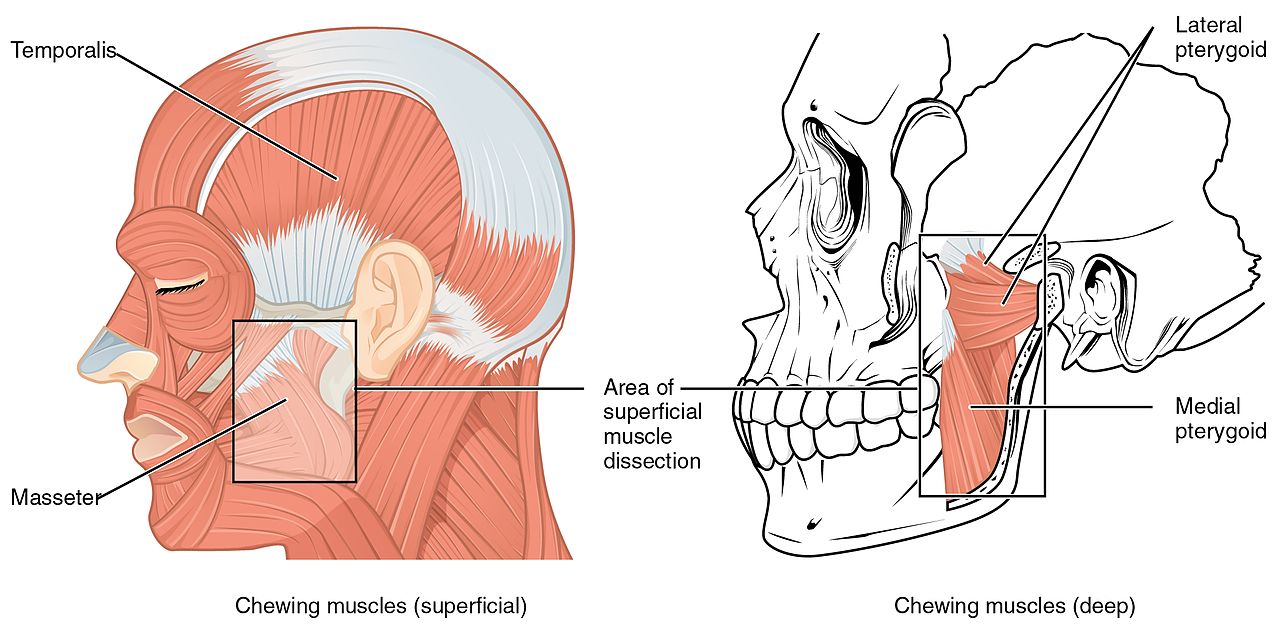[caption id="" align="aligncenter" width="574"] wikimedia.org[/caption]
wikimedia.org[/caption]
There are numerous causes for jaw pain, so it can be a little frustrating figuring out what the problem is. For instance, if you grind your teeth at night, you really have no way of knowing that's the cause unless you sleep with a partner who hears it or if a dentist sees wear on your x-rays.
If you aren't sure what's causing the pain, Dr. Alvin Danenberg--a guest writer at Drbicuspid.com--has eight ideas that might ring a bell:
8 possible causes of your patient's jaw pain
As a periodontist, I frequently treat temporomandibular joint (TMJ) pain or temporomandibular disorders (TMDs). Many of the causes of this type of jaw pain also can damage the jawbone around the roots of teeth.
In my experience, between 60% and 70% of adults have experienced some symptoms of TMD. Their most frequent complaint is pain either in the jaw joint or the jaw muscles. Patients often experience discomfort when opening their jaw, along with popping and cracking sounds in the jaw joints when opening and closing. Some patients also experience buzzing or ringing sounds in their ears.
TMDs are multifactorial, and their sources may be difficult to identify. I initially focus on the following eight related causes for TMDs:
- Trauma (such as a car accident) involving the jaw joint, which could damage the joint structures
- Clenching and grinding the teeth
- Teeth that have been improperly restored or are out of alignment
- Poor nutrition and unhealthy digestion, which could cause chronic inflammation and affect all joints in the body, such as in patients with rheumatoid arthritis
- Emotional stress, such as illustrated by a study by Lei and colleagues in Cranio (April 28, 2016).
- Lack of sleep
- Excessive estrogen, although studies vary
- Infection in the joint
Many factors affect jaw pain. The more obvious causes should be explored first. If grinding habits or bite problems exist, these must be corrected. Stress reduction, restorative sleep, and good nutrition to provide proper hormone balance must be implemented to reduce TMD symptoms. If symptoms persist, other treatment options should be considered to make the patient comfortable. Read full article here . . .
Besides the Dr. Danenberg's ideas, you may also want to consider mouth breathing. You're probably thinking what? Mouth breathing? How on earth could that cause jaw pain.
However, think about this, if you cannot breathe through your nose, then your go-to will be breathing through your mouth, which has been shown to change facial structures--especially in young children. If your jaws and muscles change to compensate this breathing pattern, they will have extra stress placed upon them. An article at NBC News goes into further detail--not only about jaw pain, but other mouth-breathing issues:
'Mouth-breathing' gross, harmful to your health
As Dr. Yosh Jefferson, a New Jersey functional orthodontist, explains, "Mouth-breathing also irritates the tonsils and adenoids, so you have a double whammy where the sinuses are congested, which causes further blockage of the upper airway." Now you really can't breathe out of that nose. What's more, when you take in oxygen through your nose, it passes over the mucous membrane and into the sinuses, which produces nitric oxide, which your body needs for all the smooth muscles, like your heart and your blood vessels. So when you're not breathing through your nose, your blood actually isn't getting all the oxygen it needs to function properly.
Jefferson believes breathing though the mouth is often an overlooked root cause of many health and behavioral problems, particularly in school-age kids. ("Just think of the child," he says. "How do you think they’re doing in school? These kids are tired, they’re irritable, they can’t concentrate in school. And a lot of these kids (may be) diagnosed with ADD and hyperactivity.")
But here's the absolute weirdest thing that mouth-breathing can cause: It can actually change the shape of kids' faces, according to a report Jefferson published last year in the journal General Dentistry. "Severe mouth breathers develop what they call long face syndrome -- long, narrow faces, very unattractive facial features. Also if their tonsils are swollen, they sometimes position their jaw in weird ways in order to get more oxygen into their bodies. It can happen in adults as well ... but it’s more prominent in children," Jefferson says. "People think they grew to this face because of genetics –- it’s not, it’s because they're mouth-breathers." It's reversible in children if it's caught early -- an orthodontist might use a device to expand the jaw, which will widen the mouth and open the sinuses, helping the child breathe through the nose again. (This can be done in adults, too, but it's more difficult.)
"It's best to treat them early," Jefferson says. "It drives me crazy that there are so many kids who are mouth breathers and no one is doing anything about it. Read full article here . . .
Although there have been no definitive studies that show that braces can correct TMJ, they can correct your bite and ideally put teeth in a position that will decrease strain on the jaws. Men and women who breathe through their mouths often have narrow maxillas and overbites--both of which can be corrected with a dentist's help. In the meantime, your dentist can reduce some wear and tear by fitting you with a mouthguard.
While you can certainly get a bite-and-bile guard at the store, these may be cumbersome and actually encourage more mouth breathing since they aren't custom-made. It's best to talk with your dentist to see what the root of the problem is in regards to your jaw pain.
The post What’s Causing Your Jaw Pain? is republished from: www.allin1dental.com
All In One Dental Innovations
7046 Dublin Blvd
Dublin, CA 94568
(925) 828-9811
info@allin1dental.com
Google My Business Listing
Google Map
Directions to our office
Yelp Page
No comments:
Post a Comment